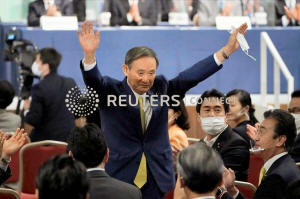Japan's Suga wins party leadership race, headed for premiership
 Send a link to a friend
Send a link to a friend
 [September 14, 2020]
By Linda Sieg and Leika Kihara [September 14, 2020]
By Linda Sieg and Leika Kihara
TOKYO (Reuters) - Japanese Chief Cabinet
Secretary Yoshihide Suga, a loyal aide to outgoing prime minister Shinzo
Abe, won a landslide victory in a ruling party leadership election on
Monday, paving the way for Japan's first change of leader in nearly
eight years.
Suga, 71, who has promised to continue Abe's key policies, said his big
win would give him the backing to pursue his reform goals - including
deregulation and breaking down bureaucratic silos - and that containing
the coronavirus and reviving the economy were conditions for calling a
snap general election.
"As I got big support in numbers today, the environment in which I can
pursue my policy agenda in a stable manner has been secured," Suga told
a news conference.
Suga won 377 votes out of 534 votes cast, and 535 possible votes, in the
leadership election by the Liberal Democratic Party (LDP) members of
parliament and representatives of its 47 local chapters.

Rival Shigeru Ishiba, a former defence minister, won 68 votes and
ex-foreign minister Fumio Kishida got 89.
Suga is virtually certain to be elected prime minister in a
parliamentary vote on Wednesday because of the LDP's majority in the
lower house. He will serve out Abe's term as party leader through
September 2021.
Suga had emerged as frontrunner in the race after Abe, Japan's
longest-serving premier, said last month he would resign because of ill
health, ending nearly eight years in office.
Speculation is swirling that Suga will call an election for parliament's
lower house as soon as next month to boost his chances of winning a full
three-year term as LDP chief next year. A vote for the chamber must be
held by late October 2021.
SNAP ELECTION?
On Monday, however, he sounded a cautious note.
"What's important now is to contain the pandemic while also reviving the
economy. I don't think we can immediately (dissolve the lower house)
just because the pandemic is contained," he said. "That's a decision
that must be made looking comprehensively at various factors."
Suga has said he would continue Abe's signature "Abenomics" strategy of
hyper-easy monetary policy, government spending and reforms while
juggling the problems of COVID-19 and a slumping economy, and
confronting longer-term issues such as Japan's ageing population and low
birth rate.
[to top of second column]
|

Japanese Chief Cabinet Secretary Yoshihide Suga gestures as he is
elected as new head of the ruling party at the Liberal Democratic
Party's (LDP) leadership election in Tokyo, Japan September 14,
2020. Eugene Hoshiko/Pool via REUTERS

Japanese manufacturers remained pessimistic for a 14th straight
month in September, a Reuters poll showed, underlining the huge
challenge the next leader faces.
Suga, whose resume is thin on diplomatic experience, faces
geopolitical challenges such as building ties with the winner of the
Nov. 3 U.S. presidential election and balancing concern over China's
maritime aggressiveness with bilateral economic interdependence.
The son of a strawberry farmer from northern Japan who got his start
in politics as a local assemblyman, Suga has since 2012 held the key
post of chief cabinet secretary, acting as Abe's top government
spokesman, coordinating policies and keeping bureaucrats in line.
"I was born as the oldest son of a farmer in Akita. Without any
knowledge or blood ties, I launched into the world of politics,
starting from zero - and have been able to become leader of the LDP,
with all its traditions and history," said Suga, whose modest
origins differ from many LDP lawmakers.
"I will devote all of myself to work for Japan and its citizens," he
said in brief remarks after the party vote.
He has an image as more of a behind-the-scenes operator than a
frontline leader but rose in opinion polls after he announced his
candidacy to succeed Abe. He won support from most LDP factions,
outpacing his rivals.
Suga also won robust backing from LDP local chapters. According to a
tally by public broadcaster NHK, he took 89 votes from the chapter
representatives versus 42 for Ishiba and 10 for Kishida.

(Additional reporting by Chang-Ran Kim, Chris Gallagher and Antoni
Slodkowski; Editing by William Mallard, Lincoln Feast and Gerry
Doyle)
[© 2020 Thomson Reuters. All rights
reserved.] Copyright 2020 Reuters. All rights reserved. This material may not be published,
broadcast, rewritten or redistributed.
Thompson Reuters is solely responsible for this content. |